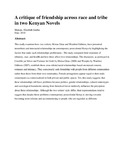| dc.description.abstract | This study examines how two writers, Moraa Gitaa and Wambui Githiora, have presented interethnic and interracial relationships in contemporary postcolonial Kenya by highlighting the factors that make such relationships problematic.: The study compared their treatment of ethnicity, race, and health and how these affect love relationships. The characters, as portrayed in Crucible jar Silver and Furnace for Gold by Moraa Gitaa (2008) and Wanjira by Wambui Githiora (2007), establish these cross ethnic/racial relationships based on mutual consent, romance and intimacy.
They consciously seek friendship with people from different communities rather than those from their own community. Female protagonists appear equal to their male counterparts as contextualized in both private and public spaces. Yet, this study suggests that these relationships still have problems because politics, gender relationships, cultural stereotypes and sociological boundaries arising from historical forces indirectly influence the perception about these relationships. Although the two writers' style differ, their representations tend to suggest that despite these problems contemporary postcolonial Kenya is moving towards becoming more tolerant and accommodating to people who are regarded as different. | en_US |

